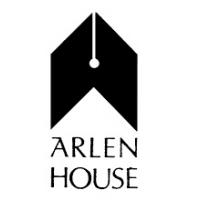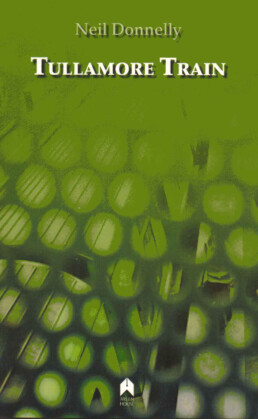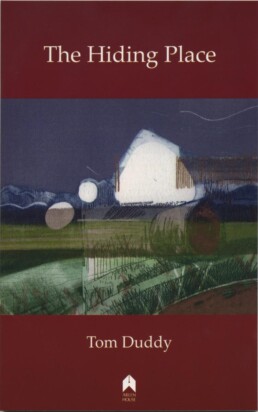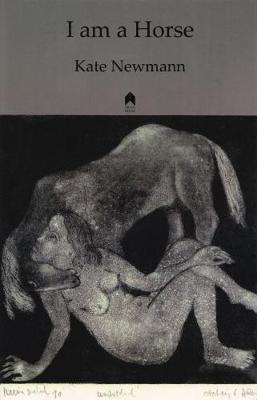Sasquatch
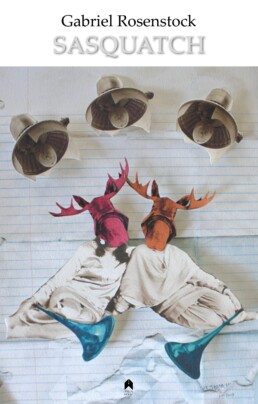
Gabriel Rosenstock
Sasquatch
ISBN:
9781851320646 hardback
Having translated so much poetry and haiku from East and West, Gabriel Rosenstock’s own poetry in Irish passes through many borders with ease. His philosophic reflexions and concern about the disappearance of species, real and imagined – so present in Sasquatch – greatly succeed in telling us what a poet used to be and should be still: the conscience of human society.
– Germain Droogenbroodt, Belgium
A rare animal seen by very few is the Sasquatch; so, too, the Poet. In these poems the Sasquatch watches the ephemeral world around him and is watched. The surprises multiply and both the watcher and the watched are united in One. With transparency of words and density of vision Gabriel Rosenstock reveals the poet within the reader.
– Dileep Jhaveri, India
Considering the fact that Gabriel Rosenstock is himself a last sasquatch of sorts, I cannot imagine any other poet writing with more authority about the last Sasquatch.
– Michael Augustin, Germany
The form merges beautifully with the theme of these touching poems and aphorisms from the heart of the wondering, wandering Sasquatch …
– Agnar Artúvertin, Faroe Islands
Sasquatch reveals itself on many levels and can be read as a dirge for a species, culture or language in irreversible decline or, on another level entirely, as a strikingly original extended metaphor for Self-Realization, an irrevocable merging with the One that always was.
– Mícheál Ó hAodha, Ireland
Readers will be drawn on this beautiful journey, wandering around in the fantastic and in the real.
- Mariko Sumikura, Japan
Na Saighneáin
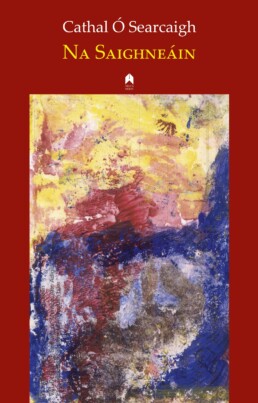
Cathal Ó Searcaigh
Na Saighneáin
ISBN:
9781851320950 paperback
Na criticeoirí ag caint faoi Aimsir Ársa:
‘Is tobar fíoruisce é Cathal Ó Searcaigh … A fhilí óga ródhúthrachta, róbhisiúla, leagaigí síos bhur bpinn ar feadh meandair agus blaisigí an cnuasach filíochta seo. Tugaigí suntas do mhodus operandi an fhile a bhfuil ar a chumas dán iontach a dhéanamh as ní ar bith faoin ngréin’
– Mícheál Ó Ruairc, Feasta (Bealtaine 2013)
‘Cathal Ó Searcaigh has enjoyed an extremely productive period over the last few years, which has seen the appearance of his powerful An tAm Marfach ina Mairfimid (Arlen House 2011) and this latest volume Aimsir Ársa (Arlen House 2013). The poems herein demonstrate that Ó Searcaigh continues to be a powerful and important voice not only for poetry in Irish but for the craft of poetry more widely’
– Ciarán Mac Murchaidh, Poetry Ireland Review (Autumn 2013)
‘Tuigimis an méid seo: guth dochloíte é guth an tSearcaigh, guth seo a ghairme is a anama, guth síoraí, guth na filíochta, guth na Gaeilge, guth na fírinne, guth na háilleachta’
– Gabriel Rosenstock, Feasta (Iúil 2013)
‘An cumas meadarachta, an stór focal agus an raon de thuineacha, an tobar de réimsí difriúla teanga atá ag Ó Searcaigh – is láidreacht iad nach bhfuil ar dhóigh ar bith coitianta’
– Gréagóir Ó Dúill, Comhar (Bealtaine 2013)
Cuir Amach Seo Dom / Riddle Me This
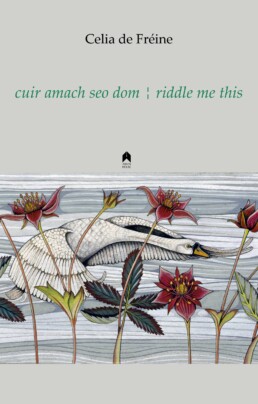
Celia de Fréine
Cuir Amach Seo Dom / Riddle Me This
ISBN:
9781851320974 hardback
Is é cuir amach seo dom : riddle me this an séú cnuasach filíochta ó pheann Celia de Fréine. Mar a thugann a theideal le fios, is freagra ar an tomhas – foirm thraidisiúnta sa tSlóivéin – atá i gceist sa dán teidil a scríobh sí le linn di a bheith sa tSlóivéin. Tá dhá shraith eile dánta sa chnuasach seo chomh maith: The Lady and the Unicorn : An Bhean Uasal is an tAonadharcach a scríobh sí i bPáras, agus Monsanto a scríobh sí sa Phortaingéil.
cuir amach seo dom : riddle me this is the sixth collection of poetry from Celia de Fréine. As its name suggests, the title poem, which she wrote while in Slovenia, takes its cue from the riddle, a traditional Slovene form. Also included in the collection are the sequences The Lady and the Unicorn : An Bhean Uasal is an tAonadharcach and Monsanto written in Paris and Portugal respectively.
Hidden Places / Scathan Eile
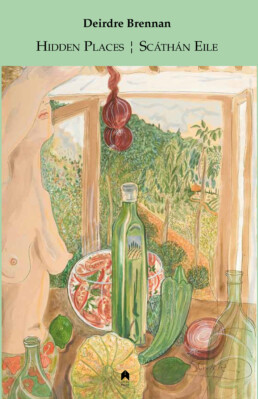
Deirdre Brennan
Hidden Places / Scathan Eile
ISBN: 9781851320318
This book, Hidden Places ¦ Scáthán Eile, consists of two separate collections of poetry, one in Irish, and one in English. Themes encompass ageing, the abandoned nest, emigration and exile, thresholds that can’t be crossed. Landscapes throb with the eternal pulses of the natural world and scenes of childhood are revisited along with violence, both physical and sexual, against young and old.
Deirdre Brennan is a bilingual writer of poetry, short stories and drama. Born in Dublin, she studied English and Latin at UCD followed by a H.Dip. in Education. Among her collections of poetry are: I Reilig na mBan Rialta (Coiscéim, 1984), Scothanna Geala (Coiscéim, 1989), a Poetry Ireland‘Choice of the Year’, Thar Cholbha na Mara (Coiscéim, 1993), Ag Mealladh Réalta (Coiscéim, 2000), an Oireachtas prizewinner, The Hen Party(Lapwing, 2001), Beneath Castles of White Sail (Divas, Arlen House, 2003), Swimming with Pelicans and Ag Eitilt fara Condair (Arlen House, 2007). Her short stories appear in The Irish Times, Passages, Anois, Comhar, Feasta, Lá and Foinse and have featured on RTÉ Radio 1, as did a six-part drama series, Go to Blazes. Her collection of short fiction was published as An Banana Bean Sí agus Scéalta Eile (Coiscéim, 2009). A founder member of Éigse Carlow Arts Festival in 1978, Deirdre was Chair and Secretary during its early years, and she was also a founder member of Comhaltas Ceoltóirí in Carlow, serving as Chair and Secretary.
Is scríbhneoir dátheangach í Deirdre Brennan. I measc an tsaothair óna peann tá filíocht, gearrscéalta agus drámaí. Rugadh i mBaile Átha Cliath í agus bhain sí céim amach sa Bhéarla agus sa Laidin i UCD agus ina dhiaidh sin, an tArd Teastas san Oideachas. Tá ocht gcnuasach filíochta foilsithe aici go dtí seo: I Reilig na mBan Rialta (Coiscéim, 1984), Scothanna Geala (Coiscéim, 1989), ‘Rogha Éigse Éireann’ na bliana sin, Thar Cholbha na Mara (Coiscéim 1993), Ag Mealladh Réalta (Coiscéim, 2000), a fuair duais san Oireachtas, The Hen Party (Lapwing, 2001), Beneath Castles of White Sail (Divas, Arlen House, 2003), Swimming with Pelicans agus Ag Eitilt fara Condair (Arlen House, 2007). Tá a gearrscéalta curtha i gcló ag The Irish Times, Passages, Anois, Comhar, Feasta, Lá agus Foinse agus craoladh iad ar RTÉ Raidió 1 chomh maith le sraith drámaí, Go to Blazes. Tá cnuasach dá gearrscéalta An Banana Bean Sí agus Scéalta Eile foilsithe ag Coiscéim. Ball den choiste a bhunaigh an fhéile ealaíne, Éigse Cheatharlach i 1978, bhí Deirdre ina rúnaí agus ina cathaoirleach ar feadh roinnt de bhlianta agus is duine de bhunaitheoirí Chomhaltas Ceoltóirí i gCeatharlach í chomh maith is í ag freastal mar chathaoirleach agus rúnaí.
Tullamore Train
Tullamore Train
Meeting the train
at Heuston
I’m looking for my mother
but no sign.
Perhaps she’s fainted
and is lying in a carriage,
fear and foreboding
beaten down inside,
until there on the chequered
concourse standing puzzled,
wondering where I am,
relief and gladness
in me as I walk to her,
she smiles, there you are, and I
thought you hadn’t come.
Neil Donnelly is from Tullamore and is best known for the plays, The Station Master, Upstarts, The Silver Dollar Boys, Chalk Farm Blues, Flying Home, The Duty Master, Butterfly.
Tullamore Train is his debut poetry collection. He is a member of Aosdána.
In Castlewood
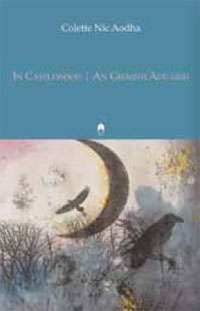
Colette Ní Ghallchóir
In Castlewood / An Ghaoth Aduaidh
ISBN:
9781851320240 paperback
9781851320349 limited edition
‘With a use of language that is marvellously inventive, Colette
Nic Aodha looks life straight in the eye’ – Michael Gorman
The poems in this dual language collection explore the themes of the individual and nature as well as the individual‘s relation to the gods. In many of the lyrics the poet portrays love as a perpetual comedy bound to fail. Nic Aodha also touches upon the alienation of the artist from society although it is supposed, in the context of the life of the artist, that through such alienation comes self-knowledge. These poems do not belong to any one time or place but they find their inspiration in diverse cultural contexts and historical settings that span millennia; from Ephesus and the mythical history of the Old Hag of Beare to the glass-bottomed Catamaran.
Tá éagsúlsacht chuimsitheach le sonrú sna téamaí difriúla a shnámhann tríd an gcnuasach seo. Pléann an file an cumann idir an duine agus Rí na nDúl, chomh maith le déithe eile, ar lámh amháin agus ar an lámh eile téann sí i ngleic leis an gcumann idir an t-ealaíontóir agus an tsochaí. I gcuid mhaith dánta is ábhar grinn an grá ar a mbíonn toradh míshásúil de shíor. Is iomaí turas a bhlaisimid sa chnuasach filíochta seo. Tá difríocht shuntasch idir na dánta Gaeilge agus na cinn Bhéarla sa chaoi a dtéann na dánta Gaeilge níos doimhne i mothúcháin rómánsacha an fhile atá mar chodarsnacht leis an saol réalaíoch a bhlaisimid nuair a phléann sí an t-ábhar céanna sna dánta Béarla.
Colette Nic Aodha was born in Shrule, Co. Mayo. She studied Irish and History in NUIG where she received a BA degree. She later returned to complete a Higher Diploma in Education and a MA in Irish. She works as a secondary school teacher. Her collections include Baill Seirce (Coiscéim, 1998); Faoi Chrann Cnó Capaill (Coiscéim, 2000); Gallúnach-Ar-Rópa (Coiscéim, 2003); Ádh Mór (Coiscéim, 2004); Sundial (Arlen House, 2005); Between Curses/Bainne Géar (Arlen House, 2006); Ainteafan (Coiscéim, 2008); Scéal Ón Oirthear (Coiscéim, 2009), Raiftearaí, i gCeartlár a Dhaoine san Aonú hAois (Coiscéim, 2009); Áilíos (Coiscéim, 2010). She edited two anthologies of her students’ poetry: Pailéad an tSaoil/Palette of Life (2006) and Duilleoga/Leaves in 2011. She currently resides in Galway.
Rugadh agus tógadh Colette Nic Aodha i Sruthar, Contae Mhaigh Eo. D’fhreastail sí ar Choláiste na hOllscoile, Gaillimh áit ar bhain sí céim sa Ghaeilge agus sa Stair amach. Rinne sí an tArdteastas san Oideachas agus máistreacht sa Ghaeilge ina dhiaidh sin agus d’oibrigh sí mar mhúinteoir meánscoile ó shin. Foilsíodh na leabhair seo uaithi: Baill Seirce (Coiscéim, 1998); Faoi Chrann Cnó Capaill (Coiscéim, 2000); Gallúnach-Ar-Rópa (Coiscéim, 2003); Ádh Mór (Coiscéim, 2004); Sundial (Arlen House, 2005); Between Curses/Bainne Géar (Arlen House, 2006); Ainteafan (Coiscéim, 2008); Scéal Ón Oirthear (Coiscéim, 2009); Raiftearaí, i gCeartlár a Dhaoine San Aonú hAois is Fiche (Coiscéim, 2009); Áilíos (Coiscéim, 2010). Chuir sí dhá leabhar dá cuid daltaí in eagar; Pailéad an tSaoil/Palette of Life (2006) agus Duilleoga/Leaves (2011). Tá cónaí uirthi i nGaillimh.
The Hiding Place
Shortlisted for the Aldeburgh Poetry Award and the Seamus Heaney Centre for Poetry Award
Tom Duddy’s poems have been published in Irish and British magazines and in several anthologies, including Best of Irish Poetry 2007, Best of Irish Poetry 2010 and The Forward Book of Poetry 2011. The Hiding Place was his debut collection. He died in 2012, aged 62.
If a child fell from a tree, or raved
with fever, or a father came in hurt
from the fields, I was the one who raced
down the roads to the far side of the town,
to the house by the river, glad
of the chance to pass one more time
through the high clanking gates
into the avenue that would slow me
to a crunching walk under the dark,
cher-cherking, rook-swaying canopy.
It never took more than the one
rat-a-tat-tat to bring to the door
the doctor’s wife whose briskly gentle hands
once fixed my collar as I stood in the rain.
− The Touch
The Other Side Of Longing
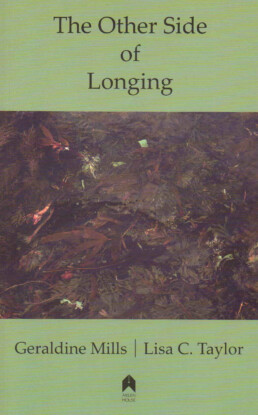
Geraldine Mills & Lisa C. Taylor
The Other Side Of Longing
ISBN: 9781851320141
In summer 2009, two award-winning poets, Lisa C. Taylor from Connecticut, and Geraldine Mills from Galway, came to a little cottage in Carna on the west coast of Ireland to forge a link between their lives. The Other Side of Longing celebrates this collaboration.
With the Atlantic Ocean as the central metaphor, they explore themes of culture, folklore, flora and fauna through a series of poems of call and response, weaving in and out of their own internal and external landscapes. This collaboration of poems is infused with each other’s experience in all its humanity, while retaining the individual voice and lyrical honesty.
Geraldine Mills is a poet and short story writer. Her poetry collections are Unearthing your Own (Bradshaw Books, 2001), Toil the Dark Harvest(Bradshaw Books, 2004) and An Urgency of Stars (Arlen House, 2009). Her short fiction collections are Lick of the Lizard (Arlen House, 2005) and The Weight of Feathers (Arlen House, 2007). She won the Hennessy/Sunday Tribune New Irish Writer Award and is a recipient of the Katherine Kavanagh Fellowship.
Lisa C. Taylor is the author of two collections of poetry, Falling Open (Alpha Beat Press) and Talking to Trees (Finishing Line Press), which was nominated for the L.L. Winship PEN New England Award. Her poems have appeared in many literary journals and she has been nominated for a Pushcart Prize. She holds a Master of Fine Arts Degree in Creative Writing from the Stonecoast Program at the University of Southern Maine.
I Am Horse
In this collection, I am a Horse, Kate Newmann relentlessly seeks to retrieve the significance of the triumphs, the sorrows, the hurts, the raptures, in her own and other lives. She has a natural and dogged affinity with mortals and this gives undeniable weight to the words, whether they be considerations of Modigliani; Stella Cartwright, the woman who loved George Mackay Brown; Messiaen; Michelangelo; Lord Franklin; Tom Crean; Nijinsky; Oscar Wilde, or about the death of her godmother, to whom the book is dedicated.
Leaving in Reesie’s flat the clumsy harmonies
we struggled to sustain; the stilted, half-filled pages
of our conversations. Sensing her plans
composing themselves in her head –
to score out time; to modulate the scales of being;
pace out the breath; resolve finally
that counterpoint of self-love and self-hate, the notes
replicating, sounding their own finality.
Because she has such searing clarity; because she is a seer into this confusion of love and hate which we call living and dying, these poems are infinitely human.
James Liddy: Selected Poems
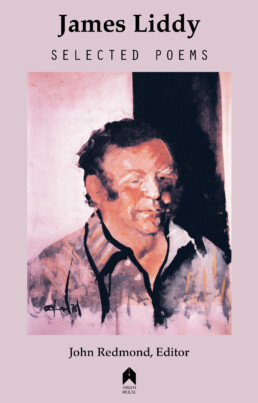
James Liddy
John Redmond (ed,)
James Liddy: Selected Poems
ISBN:
9781851320264 paperback
9781851320363 limited edition
From the ‘Introduction’ by John Redmond:
In making a case for the importance of Liddy’s canon, one could promote it, convincingly enough, as an early example of the Americanisation of Irish literature, or, in a similar vein, as an early example of ‘out’ gay Irish poetry. Still, one should be careful … Liddy had an open, many-angled view of the world and his writing is best received in a similar spirit … Among the many effects, positive and negative, of Liddy’s move to America in the mid-1960s was an attachment, manifest in his writing and conversation, to the pre-television Ireland he had left behind − this despite being a gay poet who had moved to a more tolerant culture. Having once belonged to Dublin’s literary scene, Liddy was reluctant to let that scene die, even when it seemed long dead to others. His poems − his prose-poems especially − gossip eagerly about that half-forgotten past, dropping old-fashioned names as though they still carried their original cachet … If some of his favourite themes − sex, religion, history − were not so surprising, his treatment of them usually was. Not so much an erotic poet as one who was in favour of eroticism, he was also a spiritual poet who had a lingering fascination with institutional religion … He had too, a historically informed imagination, always looking to retrieve little-known facts from the past, piecing them together in new shapes. Far from being stuck in his age group, he − again − looked both ways, towards those who were much older and those who were much younger … Like thresholds through which the freshness blows, like architraves into the blue, Liddy’s poems point beyond themselves to the rich diversity of life. Cathedrals, boys, bodies, books, food, adventures − always the pressure of a life being lived forces itself against the outlines of his verse.
